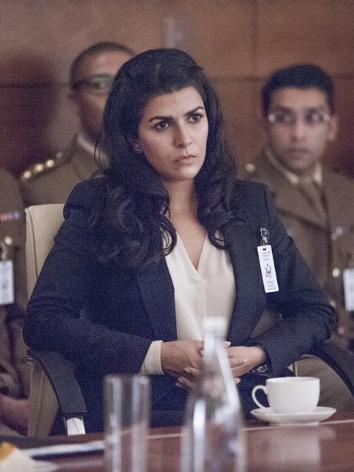This post contains spoilers for Season 4 of Homeland.
In her review of Homeland Season 4, Slate’s Willa Paskin asked that fans “let it crash on your couch for a probationary period,” promising that the show had “become a much more straightforward, and largely effective, spy show.” It felt like a long shot: After a brilliant, nail-biting first season, the show got lost in the shaky love story between CIA agent Carrie Mathison (Claire Danes) and POW-turned-terrorist-turned-CIA-puppet Nicholas Brody (Damian Lewis). It got so lost, in fact, that showrunner Alex Gansa had to basically waste an entire season killing Brody off just to get the series back on track.
And that’s exactly what happened. This season, Homeland has stopped trying to make Carrie the kind of relatable character who lets falling in love complicate her career. Season 4 Carrie issues a heat-of-the-moment order to kill Haissam Haqqani (Numan Acar), a Taliban leader who evaded her previous drone attack, despite the presence of captured Saul Berenson (Mandy Patinkin), her mentor, nearby. She manipulates Haqqani’s nephew, Aayan (Suraj Sharma), with sex, in order to make him a CIA informant (a plan Haqqani ultimately derails).
As fun as this has been, though, the vacating of Carrie’s humanity (we did see a glimpse of it in her drug-induced stupor two weeks ago) isn’t what made Homeland good again. And it wasn’t “going back to its basics” or shrinking its scope that did the trick either, as Time’s James Poniewozik has argued. Most of the credit for this season’s success goes to something new—specifically, the great additions to the ensemble cast.
When Carrie takes over as station chief in Pakistan, the CIA’s public image is in shambles. She’s at the center of a media firestorm, having ordered a drone strike on a wedding; the target was Haqqani, but instead she killed dozens of women and children. And, in what initially seems like retaliation, the ISI (Inter-Services Intelligence) coordinates an assassination of her predecessor, Sandy Bachman (Corey Stoll). So Carrie must now operate in tandem with Martha Boyd (Laila Robins), the U.S. ambassador to Pakistan, and John Redmond (Michael O’Keefe), the deputy station chief originally picked to take Bachman’s job. In the past, Carrie’s questionable instincts led her to go rogue. Now she’s stripped of that independence, for the most part. (In the season’s first few episodes, she must get Boyd’s approval just to leave the locked-down embassy.)
Carrie being Carrie, of course, she figures out a way to collude with her trusted allies Quinn (Rupert Friend), Fara (Nazanin Boniadi), and Max (Maury Sterling) on an operation to recruit Aayan without Boyd and Redmond’s knowledge. But as the season has progressed, many of the old familiar characters have faded into the background. Quinn, whose PTSD seemed poised to become a big storyline, is practically an extra at this point. (He was barely involved in the prisoner exchange to get Saul back.) Even Lockhart (Tracy Letts), the CIA director, is mostly around for dark comic relief and “What the fucking fuck?” one-liners. This has given more time for new and interesting characters like Martha’s treacherous husband, Dennis, played by Mark Moses with just the right blend of trepidation and callousness. The ISI requires him to divulge confidential information about the CIA, including what’s in Carrie’s medicine cabinet—but you get the sense that he enjoys the power that gives him, more than being terrified by it (mostly because, for once, he’s in on something his wife isn’t—or so he thinks, at least).
Dennis’ deal with the ISI, in addition to being a more logical way of deceiving the CIA than anything Brody ever did, also sets the stage for Season 4’s best new character. While Haqquani’s been the default most-wanted terrorist of the season—that one tired plot point hasn’t changed—he’s just a decoy for the real threat. As ISI agent Tasneem Quereshi, Nimrat Kaur plays this season’s most convincing villain. She makes a stealth first appearance in Episode 4, “Iron in the Fire,” when she slips into Dennis’ university lecture and instructs him to continue working for the ISI. “Who are you?” he asks fearfully when she corners him a second time—something she dislikes having to do, she says. But Tasneem continues the intimidation in subsequent episodes and emasculates most of her male colleagues, including Aasar Khan (Raza Jaffrey), the ISI counter-terrorism chief, whom she scolds for interfering in a plot to get Carrie dismissed as station chief. (She later excludes him from the prisoner-exchange talks.)
A sharp, deceptive agent, Tasneem is, in many ways, the Pakistani version of Carrie—a connection that’s probably most visible when they’re on opposite sides of the table, glaring at each other, during meetings between the ISI and the CIA. But as Carrie at one point implies to Khan, she and Tasneem are not the same. Khan has just told her that the ISI was responsible for switching her meds. “Maybe it’s what we do to each other all the time,” Carrie says. “But, it didn’t feel fair.” It’s that differing opinion about the ethics of war and her seemingly unapologetic ruthlessness—at times, even worse than Carrie’s—that makes Tasneem such an intriguing addition to the cast.
The Good Wife might still be the superior show on 9 p.m. on Sunday—for now. But Showtime recently announced that it’s picked up Homeland for a fifth season, and if the show can carry this season’s momentum into next year, The Good Wife may have some serious competition. In the meantime, you can catch up on Season 4 when all episodes re-air this weekend, beginning Nov. 29 at 3 p.m. ET.
